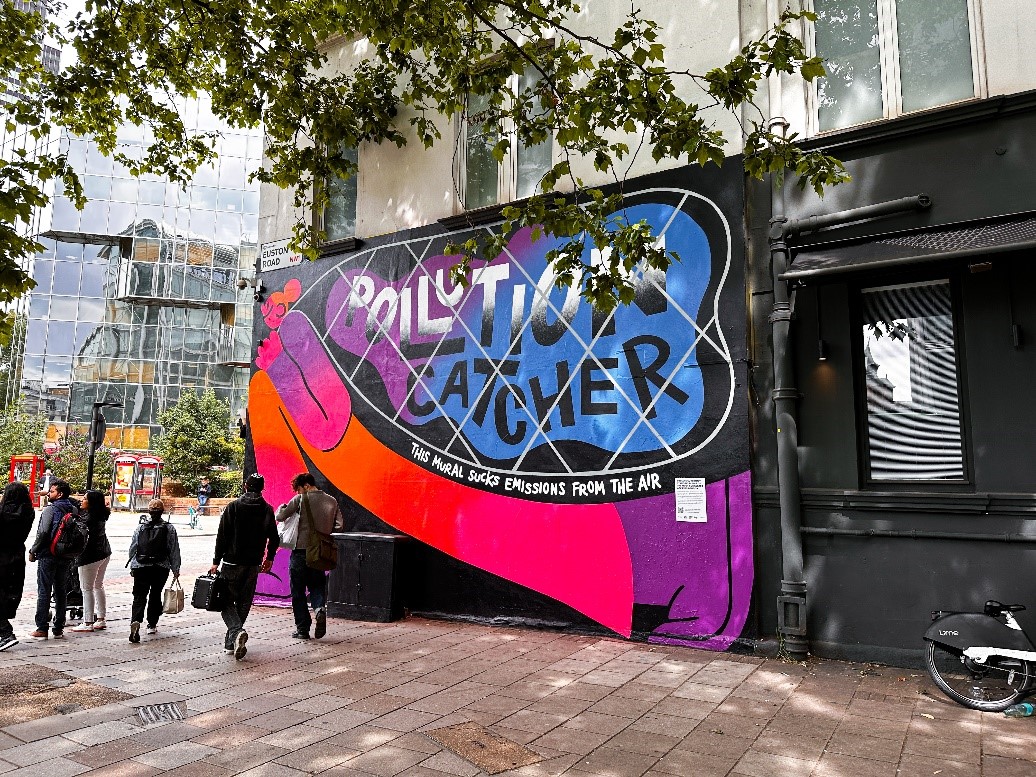Installed on one of the UK capital’s most congested streets, the artwork will raise awareness about the city’s dirty atmosphere while also actively improving it.

The piece has been painted on an eight-metre high wall on Euston Road, and has been developed by Dentsu UK&I in partnership with Global Action Plan.
This Campaign Sucks has a QR code, which the public can scan to access interactive elements, allowing them to ‘catch’ the air pollution through the art itself.
Tech development has been provided by augmented reality platform, Zappar, while the mural also utilised Clean Air by Resysten. The paint reduces nitrous oxide levels in the atmosphere by up to 73% when applied to concrete or brick, breaking down harmful pollutants into harmless, natural salts, which are then blow away by the wind. The system has an extensive operational life, meaning the longer the paint is left on a wall the greater the impact.
To realise the project, Dentsu Creative worked with Global Street Art, a specialist in hand-painted advertising, and contributes to a wider scheme bases on the Japanese idea of Sanpo Yoshi. According to this principle, actions should deliver a three-way benefit to society, businesses, and people.
‘Air pollution is the biggest environmental threat to our health, affecting us from before our first breath to our last. The good news is that solutions to our air pollution problem already exist,’ said Nicky O’Malley, Director of Corporate Partnerships at Global Action Plan.
‘This Clean Air Day, we’re encouraging everyone to take action to ensure that people can travel in cleaner and greener ways,’ they continued. ‘We are delighted to have partnered with dentsu on this project to raise public awareness of the issue in a creative and engaging way, as part of our goal that people in urban areas can breathe clean air by 2030.’
Air pollution remains one of the biggest public health risks in the world, with the UK no exception. Each year, an estimated 43,000 Britons die from conditions linked to the country’s toxic atmosphere. Steps are being taken to reduce and mitigate this, including London’s expansion of the Ultra Low Emissions Zone, which is believed to have delivered a 4.5% reduction in long-term health problems associated with emissions, and an 8% fall in respiratory issues like asthma and bronchitis.
‘Our 2024 Consumer Vision report found that 79% of UK consumers prefer to shop for brands that offer solutions that not only minimise the negative impact on the world, but rather restore and create a positive impact for the environment,’ said Pamela Stathaki, Head of Sustainability, EMEA, at Dentsu.
‘Social responsibility needs to become a core value in every business, and we need to be better at promoting and demonstrating how brands can enact change,’ she continued. ‘We are proud to be partnering with a charity as committed as Global Action Plan, that is driving change globally but also making a real difference to people’s lives in local communities.’
This year’s Clean Air Day is focused on highlighting cars and vans as the biggest sources of toxic chemicals in the air, encouraging the public to speak out and call on the next government to take action. Global Action Plan’s Clean Air Public Insight Tracker found that over half of the UK’s population are concerned about air pollution. You can find information and sign a Downing Street petition to improve air quality with investment in cleaner and greener transport here.
More on waste, pollution and recycling:
Torfaen Borough Council looks to boost recycling rates with ‘transfer station’
Amazon must take responsibility for 2m daily UK parcel deliveries
Image: Global Action Plan
- SEO Powered Content & PR Distribution. Get Amplified Today.
- PlatoData.Network Vertical Generative Ai. Empower Yourself. Access Here.
- PlatoAiStream. Web3 Intelligence. Knowledge Amplified. Access Here.
- PlatoESG. Carbon, CleanTech, Energy, Environment, Solar, Waste Management. Access Here.
- PlatoHealth. Biotech and Clinical Trials Intelligence. Access Here.
- Source: https://environmentjournal.online/waste-recycling/anti-toxin-mural-removes-pollution-in-london-on-clean-air-day/

